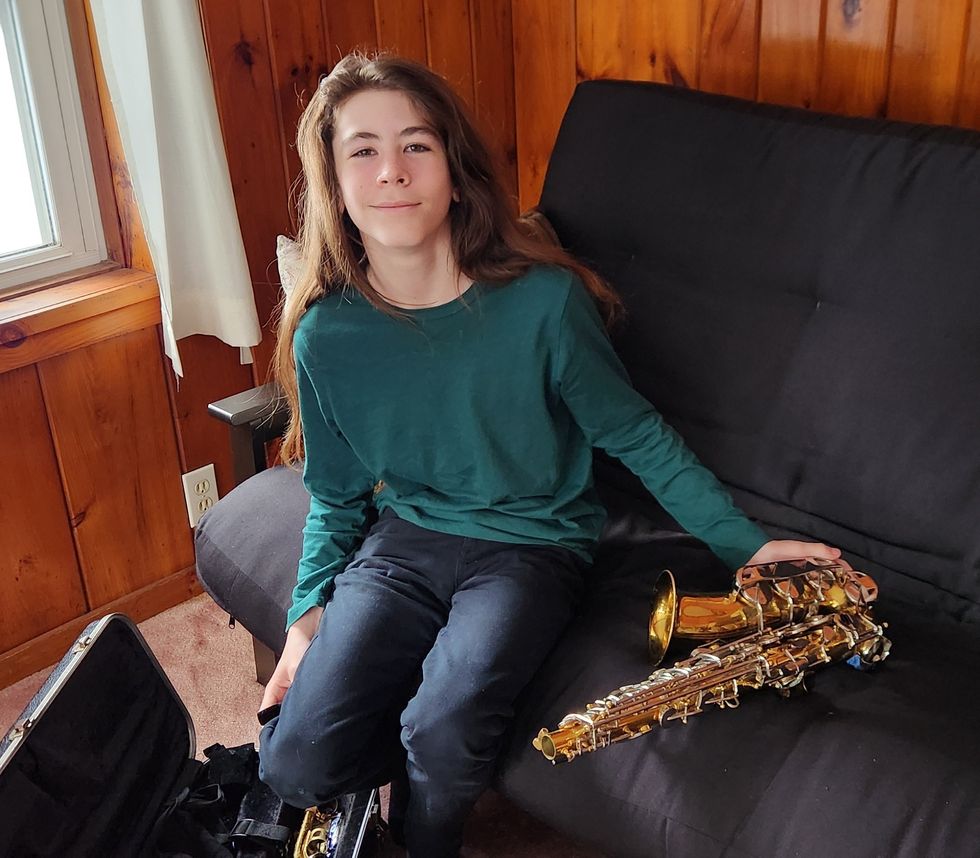Latest News
Donald Polk, right, performed “Flight of the Bumblebee” at Cornwall Consolidated School’s winter concert. A video posted online by his mother has garnered millions of views.
CORNWALL — Donald Polk, an eighth grader at Cornwall Consolidated School, had only been playing alto saxophone for two years when he performed the notoriously challenging “Flight of the Bumblebee” at his school’s Winter Holiday Concert. His mother, Tamara Polk, posted a recording of the performance to TikTok, not expecting that Donald’s audience would quickly come to outsize that of a school auditorium.
When The Lakeville Journal interviewed Polk Saturday, Dec. 21, the young musician’s scorching saxophone solo had accrued more than 1.7 million views, 360,000 likes, and 2,500 comments.
“The support has been overwhelming,” said Donny Polk, Donald’s father, continuing to say that the experience has “opened Donald’s eyes to the possibilities of music.”
For his part, Donald — whose many interests include cooking, painting and theater — said he can now see himself “doing music in the long-term.”
Of particular fascination for Polk’s new legion of fans was his mastery of circular breathing, with many of the video’s comments expressing awe at his execution of the difficult technique. Circular breathing requires wind instrument players to use their cheeks as a sort of bellows, pushing air from the mouth while inhaling through the nose, creating an uninterrupted stream of air through the instrument.
The technique is known to take months to properly grasp. For Donald, however, it came naturally.

“I looked up a YouTube tutorial,” he said. “It didn’t take too long to learn.”
To learn the piece itself, Polk utilized a practice routine taught to him by his middle school music teacher, Alicia Simonetti-Shpur.
But Simonetti-Shpur insisted that all credit is due to Donald.
“He is very motivated, he sets his own goals,” Simonetti-Shpur said, remarking that the viral performance has become a source of pride for all of Polk’s peers, who are “all paying attention to the view counts.”
Looking to garner even more views, Donald now plans to build a YouTube channel off his TikTok fame. Remaining humble even in the spotlight, Donald says he’ll continue to learn, challenge himself, and perform for others all because “it’s fun.”
The original recording of Donald’s performance can be found on Tamara’s TikTok, at tiktok.com/@maidenpaint. Donald’s own YouTube channel can be accessed at youtube.com/@DonaldPolkIII-u8k.
Donald Terance Martin
NORTH CANAAN — Dr.f Donald Terance “Doc” Martin, 86, of North Canaan, passed away on Wednesday, Dec. 18, 2024, at his home in North Canaan, which was his last wish. Dr. Martin was a dentist in Canaan, retiring in 2014. He served the community and their needs whether they could pay or not, and at all hours of the day and night. They do not make men like Don “Doc” Martin anymore.
Born on Aug. 27, 1938 in Walla Walla, Washington, he was the youngest of George T. and Anna Mae (McGrath) Martin’s eight children. Don proudly served in the US Navy with the Seabees during the Vietnam War. He adopted the Seabee’s “Can Do” attitude that served him for the rest of his life. Don married Lynne Horner in 1964.
Don was a 50-year friend of Bill W. He sponsored numerous others through his devotion to Alcoholics Anonymous. When people asked how he managed to stay sober for five decades, he said, “Don’t drink. Go to meetings. And don’t die.” And, “If you’re going to get old, you should do it in the program.”
Don fiercely loved his family, and he embraced his community. Wherever he went, people shouted, “Hi, Doc!” He enthusiastically supported local causes. In the early 1980s, he founded Friends of Football, a booster club for the Housatonic Valley Regional High School’s football team. He was a regular at Housy athletic events during his children’s years as students there, and continued to support the teams even after his youngest child graduated.
In addition to his loving wife of 60 years, Don is survived by a son, Rick Martin of Canaan, and two daughters, Kelley Marshall and her husband, Bill, of Hyde Park, New York, and Laura McCarthy and her husband, Neil, of Berlin, Connecticut. He is also survived by four grandchildren; William Marshall, V, Meagan Marshall and her fiancé, Cameron Jones, Maxim Martin and Meave McCarthy; a special friend, Jeff King, cousins Ann Kaufman, Jay Martin, Kathy Horner, Dan Horner, John Horner, Katherine Edlund, and many nieces, nephews, cousins and friends.
A memorial service will take place at 10 a.m. on Saturday, Dec. 28, 2024, at the North Canaan Congregational Church, 172 Lower Rd, East Canaan, with Pastor Mark Brady officiating. The repass follows from 12 noon to 4 p.m. at the VFW Post #6851, 104 S. Canaan Rd., Canaan, CT. In lieu of flowers, contributions in memory of Doc Martin should be made to the Fishes & Loaves Food Pantry, P.O. Box 306, North Canaan, CT 06018 or VFW Post #6851, P.O. Box 913, Canaan, CT 06018. Funeral arrangements have been entrusted to the Newkirk-Palmer Funeral Home, 118 Main Street, Canaan, CT.
The Paul Winter Consort will perform at St. James Cathedral in Great Barrington, Massachusetts, Saturday, Dec. 21.
Seven-time Grammy winning saxophonist Paul Winter, with the Paul Winter Consort, will return to celebrate the Winter Solstice on Saturday, Dec. 21, with sold out shows at 3 p.m. and 7 p.m. at Saint James Place, 352 Main St., Great Barrington, Massachusetts.
A uniquely intimate solstice celebration, in contrast to the large-scale productions done for many years in the Cathedral of Saint John the Divine in New York, it promises to deliver everything audiences have come to love and expect.
“While we will not have all the dancers and theatrical effects that were possible in the world’s largest Cathedral, we will have all the essence of our solstice music, and we will feature, as always, the beloved voice of Theresa Thomason, who has been the ‘star’ of our solstice celebrations for over 25 years,” Winter said.
The concert will feature vocalist Theresa Thomason, Eugene Friesen on cello, Bulgarian bassist Peter Slavov, Brazilian pianist Henrique Eisenmann, Brazilian drummer Rogério Boccat and Paul Winter on soprano sax.
“I was captivated by Saint James Place," Winter said. "The acoustics are heavenly, and the architecture is stunning. With seating for [250], it is possibly the most exquisite small concert hall I’ve ever seen."
Winter’s work chronicles his wide-ranging experiences in the musical traditions and natural environments of the Earth. The saxophonist, composer and bandleader founded Living Music as the recording context for his ensemble, the Paul Winter Consort, and his community of colleagues, which includes some of the world’s finest jazz, world and classical musicians, along with notable voices from the great symphony of wildlife.
He is also highly regarded for mentoring young musicians over the years, including the late Collin Walcott, a resident of Norfolk, Connecticut who was a member of the group Oregon and a member of the Paul Winter Consort in the late 1970s.
With compositions and improvisations that connect with the natural world, Winter’s music rewards exploration and opens ears to new ways of hearing. Winter has also supported Wellspring Commons, a non-profit, focusing on environmental issues, bioregionalism, and building local community.
The Paul Winter Consort, will bring their legendary Winter Solstice Celebration across New England this December, with performances in Maine, New Hampshire, Vermont, Massachusetts, New York, and Connecticut.
The Winter Solstice Celebration is a contemporary take on ancient solstice rituals, when people felt a calling to come together on the longest night of the year, to welcome the return of the Sun and birth of the new year.
“Central to all the traditions of solstice is the renewal of spirit symbolized by the rebirth of the sun,” Winter said. “Winter solstice is a time for healing and hope; it is a time to celebrate community and relatedness; and a time to honor the diversity and the unity of the great cornucopia of life on Earth. Remembering the solstice, we resonate once again with the rhythm of the cosmos and allow our hearts to embrace the optimism of our ancient knowledge that the light will overcome the darkness.”
Wake Robin Inn is located on Sharon Road in Lakeville.
LAKEVILLE — Aradev LLC has withdrawn its application to the Planning and Zoning Commission for a special permit to redevelop the Wake Robin Inn.
In a letter submitted to P&Z Chair Michael Klemens on the afternoon of Tuesday, Dec. 17, law outfit Mackey, Butts & Whalen LLP announced its client’s withdrawal.
P&Z was expected to vote on the application before the new year, but the developers withdrew before a vote took place. The decision comes after six public hearings in which Lakeville residents — particularly neighbors of the Inn on Wells Hill Rd. — aired grievances with the project.
The public cited concerns regarding environmental impacts, sewer capacity, increased traffic, noise pollution, and general incongruity with the village’s character as reasons to halt the proposed expansion.
“It feels like we’re trying to fit a square peg in a round hole,” said Sharon Road resident John Franchini at the Tuesday, Dec. 10 session of the public hearing.
The public hearing was finally closed at the Dec. 10 meeting, after which P&Z began their deliberation process on the evening of Dec. 12.
Klemens surveyed each member of the commission whether they would accept or deny the application at a vote that was scheduled for Wednesday, Dec 18. Four of the five members present said that would likely deny the application, including Klemens.
“There comes a time when you can only condition so many things before it becomes unreasonable,” said Klemens at the Dec. 12 meeting.
The commission thanked the applicant for its cooperation throughout the process, which included many revisions of its site plans as it responded to criticism from the commission and members of the public.
“They put a great effort, and they were very understanding and cordial,” said commissioner Robert Riva.
P&Z Vice Chair Cathy Shyer agreed: “Their communication with the neighbors was obviously terrific,” she said. “They were aiming for a quality product.”
During the meeting, both Klemens and commissioner Allen Cockerline suggested that it would be wise for the applicant to withdraw before any vote occurs so that they have the opportunity to reapply.
Representatives of Aradev have not yet replied for comment or announced any plans for the group moving forward.








